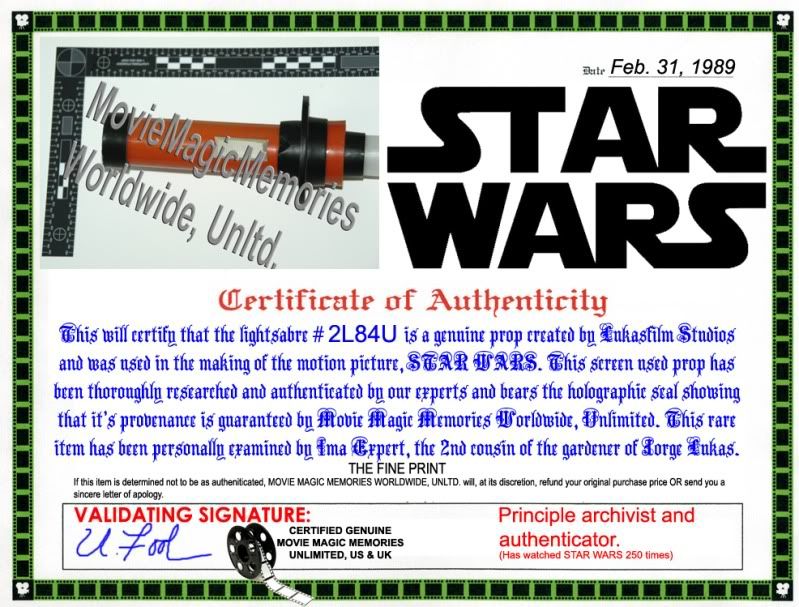handler
Well-Known Member
I understand the purpose behind a Certificate of Authenticity. It serves to verify an item as to its screen use or other type of originality. However, there are numerous places (with their own websites) that sell screen-used props which come with their own signed COA (maybe they have the original COA that they got when they acquired the item or not). Sometimes they get the prop directly from the studio or they may get it from someone who got it from the studio (or even further down the second-hand line). If the seller does have the original COA from when they acquired the prop, shouldn't they provide that along with the sale? Also, why would someone give a "copy" of a COA with the prop instead of giving the original to the buyer? To take it a step further, sometimes people (as on Ebay) don't even have a COA for the prop but state they got it from someone who worked for the studio. Even worse, sometimes COAs are faked. How do you know if it's faked if you don't know much if anything about the person/"company" of the seller? There is no database with a running list anywhere of who to trust and who to avoid.
Now, while all of that is feasible and you'd like to think all the scenarios are truthful, there's no guarantee that someone received an item from "someone" who worked on the film because there's no COA to prove it (unless you're able to get a letter of authenticity from an actor, producer, or the like who verifies the screen-used item). Unless the COA comes from a very reputable source, how are you to know that the odd company (or person working out their basement) that is not nearly as prominent as, say, the Propstore of London, actually has a COA that you can trust?
Do you have a "top" list that you religiously trust and do you know who to steer clear from? What are the best companies/individuals you trust with COAs and which are the worst that you can feel confident to stay away from? If you're buying a screen-used item, do you even bother with items that do not come with a COA?
Now, while all of that is feasible and you'd like to think all the scenarios are truthful, there's no guarantee that someone received an item from "someone" who worked on the film because there's no COA to prove it (unless you're able to get a letter of authenticity from an actor, producer, or the like who verifies the screen-used item). Unless the COA comes from a very reputable source, how are you to know that the odd company (or person working out their basement) that is not nearly as prominent as, say, the Propstore of London, actually has a COA that you can trust?
Do you have a "top" list that you religiously trust and do you know who to steer clear from? What are the best companies/individuals you trust with COAs and which are the worst that you can feel confident to stay away from? If you're buying a screen-used item, do you even bother with items that do not come with a COA?



